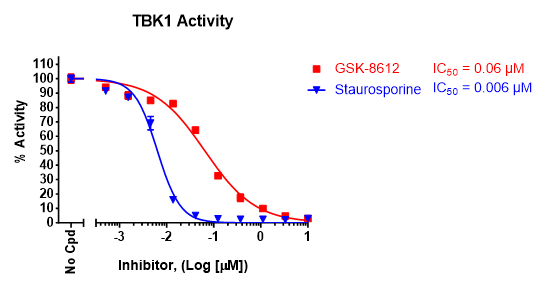Chemi-Verse™ TBK1 Kinase Assay Kit
The Chemi-Verse™ TBK1 Kinase Assay Kit is designed to measure TBK1 (TANK-binding kinase 1) serine/threonine kinase activity for screening and profiling applications using ADP-Glo™ as a detection reagent. The assay kit comes in a convenient 96-well format, with enough recombinant purified TBK1 (amino acids 2-279), kinase substrate, ATP, and kinase assay buffer for 100 enzyme reactions.
Need us to run inhibitor screens or profile your compounds against TBK1? Check out our Kinase Screening Services.
- ADP-Glo™ Kinase Assay (Promega #V6930)
- DTT (Dithiothreitol), 1M, optional
- Microplate reader capable of reading luminescence
- Adjustable micropipettor and sterile tips
- 30°C incubator
| Catalog # | Name | Amount | Storage |
| 40286 | TBK1, GST-Tag* | 5 µg | -80°C |
| 79334 | 5x Kinase Buffer 1 | 1.5 ml | -20°C |
| 79686 | 500 µM ATP | 50 µl | -20°C |
| 78514 | Myelin Basic Protein (MBP), 5 mg/ml | 100 µl | -20°C |
| 82545 | White 96-well plate | 1 | Room Temp |
*The concentration of the protein is lot-specific and will be indicated on the tube.
TBK1 (TANK-binding kinase 1) is serine/threonine kinase involved in cell proliferation, apoptosis, autophagy and immune responses. It is a non-canonical IKK (nuclear factor-κB kinase) kinase, that requires autophosphorylation to become active. It can be activated in response to pathogens, inflammatory cytokines and small GTPases such as KRAS (Kirsten rat sarcoma). This protein participates in several pathways by interacting with different adaptor proteins, which determine TBK1 localization, access to substrates, and function. For example, binding to TANK (TRAF family member associated NF-κB activator) determines a perinuclear localization, while binding to AZI2 (5-azacytidine-induced protein 2) moves the protein to the cytosol. In the context of innate immunity, TBK1 mediates IRF3/7 (interferon regulatory factor 3) activation and NF-κB signaling, resulting in cytokine production. TBK1 activity dysfunction can result in autoimmune disorders (like rheumatoid arthritis), neurodegenerative disorders (amyotropic lateral sclerosis) and cancer. The use of inhibitors for TBK1 has been studied as a therapeutic approach for inflammatory disorders and cancer, with momelotinib being tested in clinical trials. Another inhibitor, amlexanox, is being tested in the context of type II diabetes, MASH and obesity.
Runde A., et al., 2022 J Exp Clin Cancer Res 41(10):135.


